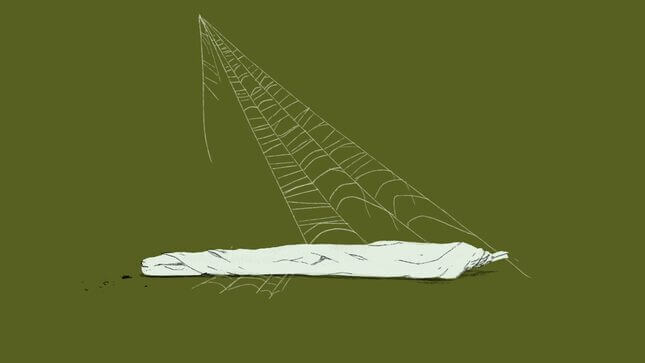
Image: Chelsea Beck/GMG
I smoked weed until I couldn’t anymore. It was that simple. My lifestyle change was about as ceremonious as taking off a shirt. I didn’t binge myself into disgust or somehow hit rock bottom on THC. My bleary eyes facilitated no hardship, my insuppressible giggles yielded no tragedy that put everything into perspective and forced me to reevaluate my choices.
I just did it just as you remove a splinter when it’s embedded in your foot. In a quest for comfort, I cut it out of my life. Refraining throughout 2018 has been as easy as not going back to a food that I’ve lost the taste for.
Quitting a drug I’ve ingested regularly for more than 20 years wasn’t the goal, it was a byproduct of excruciating weed-induced anxiety that began creeping in a few years ago. In 2014 I lived by myself for the first time in my life—no family, no significant other, no roommate. Since my earliest days smoking near the end of high school, I enjoyed the communal aspect of weed. It was a social drug, one that I rarely enjoyed in solitude. But as a result of living alone, I picked up the habit of smoking before I’d go out to a bar, as I’ve always preferred to be high instead of drunk. It wasn’t a big leap to go from socializing while getting high to getting high and then socializing with people on their own various substance-manned trips. I would smoke and then head out to whatever party or bar or thing that was happening that night, which created a fairly substantial window between getting high alone at my apartment and meeting up with friends. I think it created too much time to be alone with my thoughts. The imperious voice in my head often drowned out the music I put in my ears and the extreme human behavior happening on the subway before my eyes.
What are you doing with your life? I’d ask myself. What is the point of all of this? You should be working right now instead of fucking off and getting high. And just what is the point of writing, anyway? Do you actually think you’re going to change the world? Would you even want that responsibility if you were good enough to make it possible? (You aren’t.) And shouldn’t you be further on in your career, anyway? Wouldn’t you be involved in more by now if there were actual interest in what you have to offer? God knows you’ve been doing this long enough. Isn’t every day, then, a reminder of your failures as a writer and shortcomings as a human, which are directly responsible for your failures as a writer, which certainly are not helping your shortcomings as a human? And aren’t all humans failures anyway for not being able to penetrate space beyond our own planet? Isn’t the idea of earthly importance one big cosmic joke since no one else in the universe is counting on us for shit? If the earth overheats and we all die, isn’t the universe just going to keep on going? And doesn’t that make failure on earth even more pathetic? Huh??? Answer me!
The bombardment of self-minimizing came in waves when I was high. They were isolated periods, generally lasted 10 minutes and occurred once per high. Though brief, they were brutal. My head was left ringing from the bruising crash of existentialism and masochism. I’m still not sure whether weed was implanting false and dangerous ideas that were based on mutated speculation and distorted self-consciousness or if it was allowing me to confront myself with certain truths that I’d tuned out while sober.
My head was left ringing from the bruising crash of existentialism and masochism
Maybe those thoughts were like those parts of songs—the talking in Prince’s “How Come You Don’t Call Me Anymore,” the off-key chimes in Michael Jackson’s “Human Nature”—that I’d been overlooking for years until weed made me sensitive to them. Maybe life is easier lived when not examining every detail regarding what your life could possibly mean or look like from the outside. Maybe selective ignorance is a form of self-preservation. Even the most absorbent brain can’t take everything in; awareness is also formed by what you don’t pay attention to.
Regardless of how trustworthy those voices were, they started to terrorize my sober life. I got anxious thinking about the anxiety I knew I’d endure while high. Even now, I’m gritting my teeth recalling and recording this stuff. When I hear anyone talking about getting high, my skin starts to crawl. It’s as though my body has revolted, and quitting has meant merely going with the flow of what feels right. I haven’t intentionally ingested weed all year. I never thought I’d see the day.
In college, during my early days of smoking, I remember thinking that it would be impossible to get through a weekend without getting high. That roundabout declaration of dependence scared me a little bit, but not as much as the prospect of enduring leisure time without weed. I was never a daily smoker. I smoked through my 20s, and then in my 30s, I started regularly using edibles. I averaged a few times a week, mostly on weekends.
-

-

-

-

-

-

-

-

-

-

-

-

-

-

-

-

-

-

-

-

-

-

-

-

-

-

-

-

-

-

-

-

-

-

-

-

-

-

-

-








































